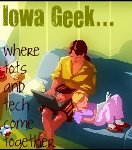Brit media gets it
>> Tuesday, February 22, 2005
Freddy thought that I would like the following article from the Guardian, Bloggers will rescue the right
For decades the national conversation in most western countries has been directed by a few talking heads. Newspapers play important roles but all the evidence suggests that broadcasters have possessed the greatest potential to frame public debate. British politicians have known that communicating their message depends upon getting the nod from a small number of powerful figures in the broadcast media.
Exactly. Think back through the past 40 years of media newscasting. Notice anything? For the most part, Democratic presidents can do no wrong and Republican presidents can do no right. Reagan got the most scorching editorials of his political life while winning the Cold War, reducing taxes, spending more on AIDS research than every other country combined, and putting people to work.
We had to take it too. The bar to entry was raised and only liberals need apply. Republicans and conservatives were relegated to small advisarial roles used by the editorial board as examples of "what not to do".
The Guardian article gives a couple of examples where bloggers have had their way over major media news outlets. There are quite a few to pick from, so he only used the biggest names, Dan Rather and Jordan Easton.
Oh wait, here's the gem of the article:
You would also expect this electronic revolution to be good for the Democrats, but the American left's relationship with the internet has been disastrous. The internet has sunk a knife into Bill Clinton's moderate Democratic party. Mainstream business people were Clinton's principal funders, simultaneously approving and driving his centrism. But the Democrats' new paymasters are the 600,000 computer users who, in 2004, supported Howard Dean's bid for his party's presidential nomination. Dean energised an unrepresentative group of voters with a stridently anti-war message. Electronic money powered Dean's campaign, and all of the other contenders for the Democratic crown soon pandered to his base.
So Republicans use the Internet to debate, spread the word and get out the dedicated, while Democrats were pulled further to the left by a handful of Internet users. Okay 600,000 is more than a handful, but it's still the slimest of minorities compared to the 50+ million people that closed their eyes and voted for Kerry.
Okay, one last quote from the article, I promise this is it...
All this should put the fear of God into the metropolitan elites. For years there have been widening gaps between the governing class and the governed and between the publicly funded broadcasters and the broadcasted to.
Until now voters, viewers and service users have not had easy mechanisms by which to expose officialdom's errors and inefficiencies. But, because of the internet, the masses beyond the metropolitan fringe will soon be on the move. They will expose the lazy journalists who reduce every important public policy issue to how it affects opinion-poll ratings.
What we have is a large group of people posting on every topic imaginable, not for money or fame. Or at least, not entirely for fame or trackbacks and I certainly don't expect to be able to pay my bills based on my blogging abilities. So why do we do it? Because we want to make a difference and because we can. I don't know which one is more important, but the end result is that being able to communicate this way can influence other, more established, sources. Don't expect the reporters to like it though.










